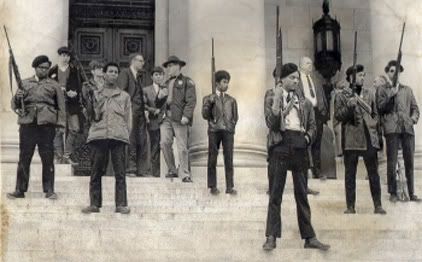

According to Hill, this is the true resistance that enforced civil rights in areas of the Deep South. Often it was local (armed) communities that laid the foundation for equal opportunities to be attained by African Americans. National organizations played their role, exposing the problems, but it was local organizations and individuals who implemented these rights and were not fearful of reactionary Whites who wanted to keep segregation alive. Without these local organizations pushing for their rights and, many times, using self-defense tactics, not much would have changed, according to Hill.
An example of the need for self-defense to enable substantial change in the Deep South took place in early 1965. Black students picketing the local high school were confronted by hostile police and fire trucks with hoses. A car of four Deacons emerged and, in view of the police, calmly loaded their shotguns. The police ordered the fire truck to withdraw. This was the first time in the 20th century, as Lance Hill observes, “an armed black organization had successfully used weapons to defend a lawful protest against an attack by law enforcement.”[4] Hill gives as another example: “In Jonesboro, the Deacons made history when they compelled Louisiana governor John McKeithen to intervene in the city’s civil rights crisis and require a compromise with city leaders — the first capitulation to the civil rights movement by a Deep South governor.”
https://en.wikipedia.org/wiki/Deacons_for_Defense_and_Justice
The black community of Richmond, California, wanted protection against police brutality.[46] With only three main streets for entering and exiting the neighborhood, it was easy for police to control, contain, and suppress the majority African-American community.[47] On April 1, 1967, a black, unarmed twenty-two-year-old construction worker named Denzil Dowell was shot dead by police in North Richmond.[48] Dowell's family contacted the Black Panther Party for assistance after county officials refused to investigate the case.[49] The Party held rallies in North Richmond that educated the community on armed self-defense and the Denzil Dowell incident.[50] Police seldom interfered at these rallies because every Panther was armed and no laws were broken.[51] The Party's ideals resonated with several community members, who then brought their own guns to the next rallies.
Awareness of the Black Panther Party for Self-Defense grew rapidly after their May 2, 1967, protest at the California State Assembly. On May 2, 1967, the California State Assembly Committee on Criminal Procedure was scheduled to convene to discuss what was known as the "Mulford Act", which would make the public carrying of loaded firearms illegal. Eldridge Cleaver and Newton put together a plan to send a group of 26 armed Panthers led by Seale from Oakland to Sacramento to protest the bill. The group entered the assembly carrying their weapons, an incident which was widely publicized, and which prompted police to arrest Seale and five others. The group pleaded guilty to misdemeanor charges of disrupting a legislative session.
https://en.wikipedia.org/wiki/Black_Panther_Party
This is what happens when the contributions made by non-pacifist black activists are ignored and slowly erased from history. People have no idea why they have the rights that they do or how they got them. There's a reason why people like prosecutor McGinty quote Martin Luther King Jr. so frequently.







